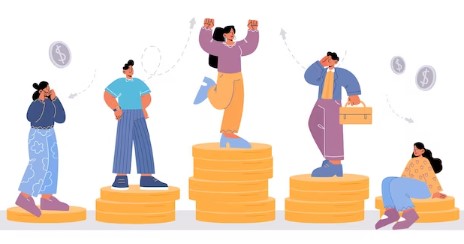“All Steve [Schwartzman, Blackstone’s CEO] kept saying throughout breakfast,” my friend told me, “is ‘how the F* is Larry Page worth $15 billion and I’m only worth $3 billion’.”
–via James Altucher (source)
When people think about how money relates to their personal life goals, they usually go through four stages, which are different from the life cycle savings and investing stages. I usually only deal with the first three of these, because once they’ve reached the fourth stage, unless they’re doing estate planning work, they really don’t need me.
In fact, I’m willing to bet dollars to doughnuts (which, by the way, would Krispy Kreme succeed in any other country but the U.S.?) that at least 99% of my readers are in stages 1-3.
The Four Stages of You and Your Money

Stage 1: What the Heck am I Doing?!?
Almost all of us start off at this stage. Few of us are fortunate enough to figure it all out before we become independent adults in the real world with real bills to pay and a real job that provides us the income to pay those bills.
I was definitely there, as I relate in “My Most Mortifying Money Moment.” I knew, objectively, that what I was doing with my money wasn’t particularly bright (a euphemism for stupid), but that didn’t cause me to change my behaviors one iota.
There are many different paths to get out of stage 1. Some people never exit. Some exit and return, wondering how, when they’d paid off their credit cards, they got back into the same mess. I did that. It felt like going back to jail. Well, I’ve never gone to jail except to do my mandatory visit to a soldier I’d put in there, but I can imagine what it’s like if you don’t want to go back and slip up.
Stage 2: Figuring It Out
In this stage, you have admitted that you have a problem (which could range from metric tons of debt to simply “I don’t know what I don’t know”) and are starting to take steps towards addressing those problems and getting yourself on the game plan to meet your goals. Some of you go to the Internet and read everything you can. Others order every book possible from Amazon. Some of you might actually (gasp!) seek the services of a financial planner to help you come up with the steps you need to take to get where you’re going. By the way, I know of this awesome course that can help you with stage 2…
However you manage your journey through stage 2, it’s important that you inculcate and internalize the lessons learned in this stage so that your actions that help you use money as a tool to succeed with your life’s goals become muscle memory. They have to be psychologically tied to internal reasons and values so that you don’t get distracted by the first shiny object (or “irresistible” sale) that comes along and you slip back into stage 1.
Stage 3: The Grind
Once you are in stage 3, it’s just a matter of time and the miracle of compounding interest before you can exit this stage. As much as snake oil sales people indexed universal life insurance salespeople would like for you to believe that there are shortcuts and that you can have your cake and eat it too, there is no magic bullet that can make this stage go faster without taking significant risks that may slide you back down into stage 1.
Sure, if you want to take a shot with your at-risk capital, go for it, but don’t keep going back to the well to find the financial equivalent of Madeleine l’Engle’s tesseracts.
You’ll be tempted. It seems like forever to get where you’re going, but it won’t be. I remember when we were paying off our mortgage, my poor wife had to deal with me talking about it on nearly every evening dog walk. I’m sure she was glad when we did pay it off just so I’d stop talking about the #$*()$)(#*%&*(#(*&%$&*( mortgage!
Our evening dog walks are much quieter now, for some reason…I don’t understand why!
But, through persistence, application, and continually bumping up your savings, you’ll eventually reach the hallowed land.
Stage 4: The Glide
In this stage, money is no longer a worry. You’re done. You’re not working. You’re living off of the fruits of your labor. You get to give back. You get to spend your time however you want. You have to figure out what you’re going to do all day.
#firstworldproblems
Yo, Stage 3 Readers! This is Important!
A recurring theme I see with my clients is that they get to the point in stage 3 where they can go to stage 4 and live a blissful life.
But they keep going in stage 3!
They’ve won the game! They are done! There is no need to take more risks. Take the ball and go home!
However, they keep plugging away acting as if they’re as far away from stage 4 as they were the day they started stage 3.
Why is this?
- They don’t think the cushion is soft, fluffy, or big enough: for some people, there is no such concept as too much safety. For whatever reason, whether it’s not trusting the methodologies used to arrive at “the number”, inner scripts that say that they don’t deserve the wealth they have, a Protestant work ethic, you name it, good enough never is. For example, I define a successful retirement scenario as one where 90% of my Monte Carlo simulations are successful when the youngest spouse reaches 100. That means that there’s about a 0.1% chance of failure (algorithmically speaking). Yet, just like the people who fear that the plane that they are on will fall out of the sky, their limbic systems incorrectly demand perfection. See “Monkey Brain Confuses Rates and Raw Numbers” to learn more about this limbic system response.
- They use money as a scorecard: I’ve had clients tell me this straight up before. They use money as a scorecard against others. My response: get a new scorecard. Find a new way to define your self-worth that does not include your net worth. He who has the most toys when he dies is still dead.
- They’re entrenched in habits: Get up. Get ready for work. Go to work. Come home. Decompress. Eat. Go to bed. Lather, rinse, repeat. The routine becomes so ingrained in the psyche that they don’t even dare contemplate an alternative. They’re afraid of becoming Bear Bryant.
What can people who are way past the exit point to get onto stage 4 but continue trucking along on stage 3 do?
- Revisit a worst case scenario: Figure out what the absolute worst that can happen to you is. Think of yourself as if you’re a movie in that scenario. Can you handle it? What will you do? Is it truly the worst case scenario that is likely to happen, or are you playing Armageddon in your mental home theater? Be realistic and don’t let fear of the unknown paralyze you from action. Make the unknown known so that you can determine if it’s something you could deal with if you truly were on the far tail end of a bell curve.
- Understand your personal values: If you’re working and continuing to take shots because you’re trying to achieve some greater good that is in alignment with your personal values, then great! Keep on keeping on! However, most people, when they truly stop to think about their personal values and what’s important to them, realize that they’re not acting in a way that aligns with those values.
- Get advice from a trusted source: Whether that’s your financial planner, your estate planning attorney, your accountant, a CFA, or someone else who is educated and experienced enough to offer useful advice, sometimes getting that second opinion is what you truly need to break the cycle.
Taking the step from stage 3 to stage 4 is a big deal and potentially scary. Most people who are at that decision point think that the decision is irrevocable. It’s not irrevocable, by the way. Some blow right by it and never realized that they could take the step.
Whatever the reason, once you have won, stop playing the game! At least, if you’re my client, please stop playing the game!
Are you in stage 3 when you could have potentially moved to stage 4? Why do you think that is? How hard is it to move from stage to stage?
Author Profile
- John Davis is a nationally recognized expert on credit reporting, credit scoring, and identity theft. He has written four books about his expertise in the field and has been featured extensively in numerous media outlets such as The Wall Street Journal, The Washington Post, CNN, CBS News, CNBC, Fox Business, and many more. With over 20 years of experience helping consumers understand their credit and identity protection rights, John is passionate about empowering people to take control of their finances. He works with financial institutions to develop consumer-friendly policies that promote financial literacy and responsible borrowing habits.
Latest entries
 Low Income GrantsSeptember 25, 2023How to Get a Free Government Phone: A Step-by-Step Guide
Low Income GrantsSeptember 25, 2023How to Get a Free Government Phone: A Step-by-Step Guide Low Income GrantsSeptember 25, 2023Dental Charities That Help With Dental Costs
Low Income GrantsSeptember 25, 2023Dental Charities That Help With Dental Costs Low Income GrantsSeptember 25, 2023Low-Cost Hearing Aids for Seniors: A Comprehensive Guide
Low Income GrantsSeptember 25, 2023Low-Cost Hearing Aids for Seniors: A Comprehensive Guide Low Income GrantsSeptember 25, 2023Second Chance Apartments that Accept Evictions: A Comprehensive Guide
Low Income GrantsSeptember 25, 2023Second Chance Apartments that Accept Evictions: A Comprehensive Guide

